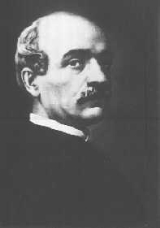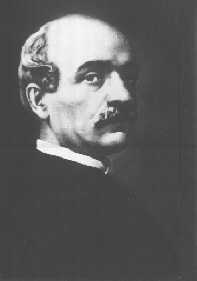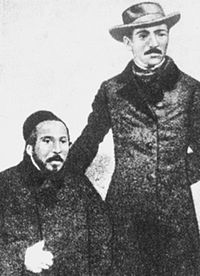
Vasile Alecsandri
Encyclopedia

Romania
Romania is a country located at the crossroads of Central and Southeastern Europe, on the Lower Danube, within and outside the Carpathian arch, bordering on the Black Sea...
n poet
Poet
A poet is a person who writes poetry. A poet's work can be literal, meaning that his work is derived from a specific event, or metaphorical, meaning that his work can take on many meanings and forms. Poets have existed since antiquity, in nearly all languages, and have produced works that vary...
, playwright
Playwright
A playwright, also called a dramatist, is a person who writes plays.The term is not a variant spelling of "playwrite", but something quite distinct: the word wright is an archaic English term for a craftsman or builder...
, politician, and diplomat
Diplomat
A diplomat is a person appointed by a state to conduct diplomacy with another state or international organization. The main functions of diplomats revolve around the representation and protection of the interests and nationals of the sending state, as well as the promotion of information and...
. He collected Romanian folk songs and was one of the principal animators of the 19th century movement for Romanian cultural identity and union of Moldavia
Moldavia
Moldavia is a geographic and historical region and former principality in Eastern Europe, corresponding to the territory between the Eastern Carpathians and the Dniester river...
and Wallachia
Wallachia
Wallachia or Walachia is a historical and geographical region of Romania. It is situated north of the Danube and south of the Southern Carpathians...
.
Origins and childhood
Alecsandri was born in the Moldavian town of BacăuBacau
Bacău is the main city in Bacău County, Romania. It covers a land surface of 43 km², and, as of January 1, 2009, has an estimated population of 177,087. The city is situated in the historical region of Moldavia, at the foothills of the Carpathian Mountains, and on the Bistriţa River...
, to a family of landowners. His parents were Vasile Alecsandri and Elena Cozoni, and his mother was the daughter of a Greek
Greeks
The Greeks, also known as the Hellenes , are a nation and ethnic group native to Greece, Cyprus and neighboring regions. They also form a significant diaspora, with Greek communities established around the world....
Romanian merchant. His parents had seven children, of which three survived: one daughter, Catinca, and two sons, Iancu — a future army colonel
Colonel
Colonel , abbreviated Col or COL, is a military rank of a senior commissioned officer. It or a corresponding rank exists in most armies and in many air forces; the naval equivalent rank is generally "Captain". It is also used in some police forces and other paramilitary rank structures...
— and Vasile.
The family prospered in the lucrative business of salt
Salt
In chemistry, salts are ionic compounds that result from the neutralization reaction of an acid and a base. They are composed of cations and anions so that the product is electrically neutral...
and cereals trade
Trade
Trade is the transfer of ownership of goods and services from one person or entity to another. Trade is sometimes loosely called commerce or financial transaction or barter. A network that allows trade is called a market. The original form of trade was barter, the direct exchange of goods and...
. In 1828, they purchased a large estate in Mirceşti
Mircesti
Mirceşti is a commune in Iaşi County, Romania. It is composed of two villages, Iugani and Mirceşti. It also included the villages of Izvoarele, Răchiteni and Ursăreşti until 2004, when these were split off to form Răchiteni Commune.-References:...
, a village near Siret River
Siret River
The Siret or Sireth is a river that rises from the Carpathians in the Northern Bukovina region of Ukraine, and flows southward into Romania for 470 km before it joins the Danube...
. The young Vasile spent time there studying with a devout monk
Monk
A monk is a person who practices religious asceticism, living either alone or with any number of monks, while always maintaining some degree of physical separation from those not sharing the same purpose...
from Maramureş
Maramures
Maramureș may refer to the following:*Maramureș, a geographical, historical, and ethno-cultural region in present-day Romania and Ukraine, that occupies the Maramureș Depression and Maramureș Mountains, a mountain range in North East Carpathians...
, Gherman Vida, and playing with Vasile Porojan, a Gypsy boy who became a dear friend. Both characters would later appear in his work.
Adolescence and youth
Between 1828 and 1834, he studied at the Victor Cuenim 'pensionnat', an elite boarding school for boys in IaşiIasi
Iași is the second most populous city and a municipality in Romania. Located in the historical Moldavia region, Iași has traditionally been one of the leading centres of Romanian social, cultural, academic and artistic life...
. He moved to Paris
Paris
Paris is the capital and largest city in France, situated on the river Seine, in northern France, at the heart of the Île-de-France region...
in 1834, where he dabbled in chemistry
Chemistry
Chemistry is the science of matter, especially its chemical reactions, but also its composition, structure and properties. Chemistry is concerned with atoms and their interactions with other atoms, and particularly with the properties of chemical bonds....
, medicine
Medicine
Medicine is the science and art of healing. It encompasses a variety of health care practices evolved to maintain and restore health by the prevention and treatment of illness....
, and law
Law
Law is a system of rules and guidelines which are enforced through social institutions to govern behavior, wherever possible. It shapes politics, economics and society in numerous ways and serves as a social mediator of relations between people. Contract law regulates everything from buying a bus...
, but soon abandoned all in favor of what he called his "lifelong passion", literature
Literature
Literature is the art of written works, and is not bound to published sources...
. He penned his first literary essays in 1838 in French
French language
French is a Romance language spoken as a first language in France, the Romandy region in Switzerland, Wallonia and Brussels in Belgium, Monaco, the regions of Quebec and Acadia in Canada, and by various communities elsewhere. Second-language speakers of French are distributed throughout many parts...
, which he had mastered to perfection during his stay in Paris. After a brief return home, he left for Western Europe
Western Europe
Western Europe is a loose term for the collection of countries in the western most region of the European continents, though this definition is context-dependent and carries cultural and political connotations. One definition describes Western Europe as a geographic entity—the region lying in the...
again, visiting Italy
Italy
Italy , officially the Italian Republic languages]] under the European Charter for Regional or Minority Languages. In each of these, Italy's official name is as follows:;;;;;;;;), is a unitary parliamentary republic in South-Central Europe. To the north it borders France, Switzerland, Austria and...
, Spain
Spain
Spain , officially the Kingdom of Spain languages]] under the European Charter for Regional or Minority Languages. In each of these, Spain's official name is as follows:;;;;;;), is a country and member state of the European Union located in southwestern Europe on the Iberian Peninsula...
, and southern France
France
The French Republic , The French Republic , The French Republic , (commonly known as France , is a unitary semi-presidential republic in Western Europe with several overseas territories and islands located on other continents and in the Indian, Pacific, and Atlantic oceans. Metropolitan France...
.
Romantic interest
A year later, Alecsandri attended a party celebrating the name day of Costache Negri, a family friend. He there fell in love with Negri's sister. The 21-year old and not long divorced Elena Negri responded enthusiastically to the 24-year old youngster's love declarations. Alecsandri began writing love poems until a sudden illness forced Elena to head abroad to VeniceVenice
Venice is a city in northern Italy which is renowned for the beauty of its setting, its architecture and its artworks. It is the capital of the Veneto region...
. He met her there, where they shared two torrid months.
They cruised to Austria
Austria
Austria , officially the Republic of Austria , is a landlocked country of roughly 8.4 million people in Central Europe. It is bordered by the Czech Republic and Germany to the north, Slovakia and Hungary to the east, Slovenia and Italy to the south, and Switzerland and Liechtenstein to the...
, Germany
Germany
Germany , officially the Federal Republic of Germany , is a federal parliamentary republic in Europe. The country consists of 16 states while the capital and largest city is Berlin. Germany covers an area of 357,021 km2 and has a largely temperate seasonal climate...
, and to Alecsandri's former romping grounds, France. Elana's chest illness aggravated in Paris, and after a brief stint in Italy, they both boarded a French ship to return home 25 April 1847. Tragedy struck on the ship, when Elena died in her lover's arms. Alecsandri channeled his mourning into a poem, "Steluţa" (Little Star). Later, he dedicated his "Lăcrimioare" (Little Tears) collection of poems to her.
Political involvement
In 1848, he became one of the leaders of the revolutionary movement based in IaşiMoldavian Revolution of 1848
The Moldavian Revolution of 1848 was an unsuccessful Romanian liberal and Romantic nationalist revolt in the principality of Moldavia. Part of the Revolutions of 1848, and closely connected with the successful uprising in Wallachia, it sought to overturn the administration imposed by Imperial...
. He wrote a widely read poem urging the public to join the cause, "Către Români" (To Romanians), later renamed "Deşteptarea României" (Romania's Awakening). Together with Mihail Kogălniceanu and Costache Negri, he wrote a manifesto of the revolutionary movement in Moldavia, "Dorinţele partidei naţionale din Moldova" (Wishes of the National Party of Moldavia).
However, as revolution failed, he fled Moldavia through Transylvania
Transylvania
Transylvania is a historical region in the central part of Romania. Bounded on the east and south by the Carpathian mountain range, historical Transylvania extended in the west to the Apuseni Mountains; however, the term sometimes encompasses not only Transylvania proper, but also the historical...
and Austria
Austria
Austria , officially the Republic of Austria , is a landlocked country of roughly 8.4 million people in Central Europe. It is bordered by the Czech Republic and Germany to the north, Slovakia and Hungary to the east, Slovenia and Italy to the south, and Switzerland and Liechtenstein to the...
, moving on to Paris
Paris
Paris is the capital and largest city in France, situated on the river Seine, in northern France, at the heart of the Île-de-France region...
, where he continued to write political poems.
Literary achievements

Miorita
Mioriţa is an old Romanian pastoral ballad and considered one of the most important pieces of Romanian folklore. It has several, quite different in content versions, one of which was selected by Vasile Alecsandri to the form the textbook reference.-Content:The setting is a simple one: three...
", "Toma Alimoş", "Mânăstirea Argeşului", and "Novac şi Corbul." His volume of original poetry, "Doine şi Lăcrămioare", further cemented his reputation.
Broadly revered in Romanian cultural circles, he oversaw the establishment of "România Literară
România Literară
România literară is a cultural and literary magazine from România founded in 1855 by Vasile Alecsandri and published in Iași between January 1, 1855 until December 3, 1855, when it was suppressed. The new series appeared in October 10, 1855 as a continuation of Gazeta literară...
", to which writers from both Moldavia and Wallachia contributed. He was one of the most vocal unionists, supporting the union the two Romanian provinces, Moldavia
Moldavia
Moldavia is a geographic and historical region and former principality in Eastern Europe, corresponding to the territory between the Eastern Carpathians and the Dniester river...
and Wallachia
Wallachia
Wallachia or Walachia is a historical and geographical region of Romania. It is situated north of the Danube and south of the Southern Carpathians...
. In 1856, he published in Mihail Kogălniceanu's newspaper, Steaua Dunării, the poem "Hora Unirii", which became the anthem of the unification movement.
New romantic interest
The end of 1855 saw Alecsandri pursuing a new romantic interest, in spite of promises made to Elena Negri on her deathbed. At age 35, the now renowned poet and public figure fell in love with the young Paulina Lucasievici, the daughter of an innkeeper. The romance moved at a lightning pace: they moved in together to Alecsandri's estate at Mirceşti and, in 1857, their daughter Maria was born.Political fulfilment
Alecsandri found satisfaction in the advancement of those political causes he had long championed. The two Romanian provinces united and he was appointed minister of External Affairs by Alexandru Ioan Cuza. He toured the West, pleading to some of his friends and acquaintances in Paris to acknowledge the newly formed nation and support its emergence in the turbulent BalkanBalkans
The Balkans is a geopolitical and cultural region of southeastern Europe...
area.
Retreat at Mirceşti
The diplomatic tours tired him. In 1860, he settled in Mirceşti for what would be the rest of his life. He married Paulina more than a decade and a half later, in 1876.Between 1862 and 1875, Alecsandri wrote 40 lyrical poems, including "Miezul Iernii, "Serile la Mirceşti, "Iarna," "La Gura Sobei", "Oaspeţii Primăverii", and "Malul Siretului." He also dabbled in epic poems, collected in the volume "Legende" , and he dedicated a series of poems to the soldiers who participated in the Romanian War of Independence
Romanian War of Independence
The Romanian War of Independence is the name used in Romanian historiography to refer to the 1877-1878 Russo-Turkish war, following which Romania, fighting on the Russian side, gained independence from the Ottoman Empire...
.
In 1879, his "Despot-Vodă" drama received the award of the Romanian Academy
Romanian Academy
The Romanian Academy is a cultural forum founded in Bucharest, Romania, in 1866. It covers the scientific, artistic and literary domains. The academy has 181 acting members who are elected for life....
. He continued to be a prolific writer, finishing a fantastic comedy, "Sânziana şi Pepelea," (1881) and two dramas, "Fântâna Blanduziei" (1883) and "Ovidiu" (1884).
In 1881, he wrote Trăiască Regele
Traiasca Regele
Trăiască Regele was the national anthem of the Principality of Romania and later Kingdom of Romania between 1866 and 1947. The music was composed in 1862 by Eduard Hübsch, an army captain who later became the chief of the music department of the Minister of War...
(Long Live the King), which became the national anthem of the Kingdom of Romania
Kingdom of Romania
The Kingdom of Romania was the Romanian state based on a form of parliamentary monarchy between 13 March 1881 and 30 December 1947, specified by the first three Constitutions of Romania...
until the abolition of monarchy in 1947.
Long suffering from cancer
Cancer
Cancer , known medically as a malignant neoplasm, is a large group of different diseases, all involving unregulated cell growth. In cancer, cells divide and grow uncontrollably, forming malignant tumors, and invade nearby parts of the body. The cancer may also spread to more distant parts of the...
, Alecsandri died in 1890 at his estate in Mirceşti.
Further reading
- G. C. Nicolescu, "Viaţa lui Vasile Alecsandri" Bucharest, 1975

